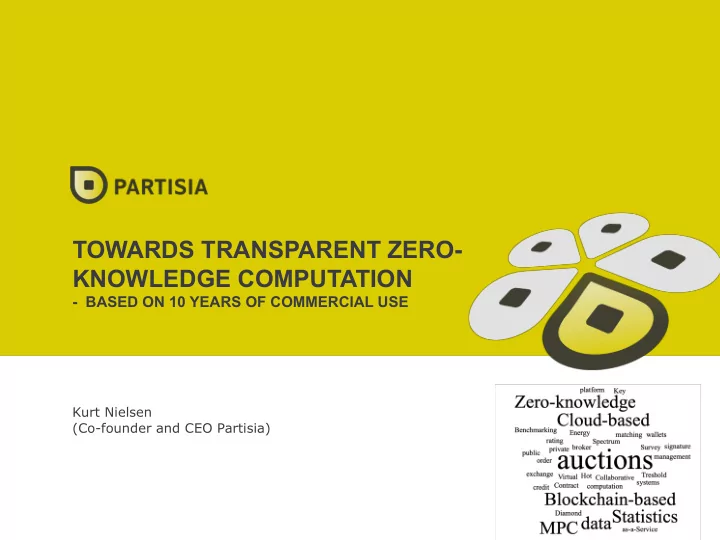

TOWARDS TRANSPARENT ZERO- KNOWLEDGE COMPUTATION - BASED ON 10 YEARS OF COMMERCIAL USE Kurt Nielsen (Co-founder and CEO Partisia)
Transparency and scalability PROTOCOLS PLATFORMS Landmark paper “Secure Multiparty Computation Goes Live” from Financial Cryptography 2009 LAN - Transparent - Difficult to scale CLOUD - Less transparent - Scalable Auctions Key mgt BLOCKCHAIN - More transparent Survey Stat - Scalable if … LP ML 2
Trust – real or perceived? Single point of trust No single point of trust MPC Who control the nodes? • Participant based trust • Delegated trust 3
Partisia group (10 years since first commercial use) • Established in 2008 • Established in 2010 • Established in 2013 • Established in 2018 • First commercial use • Tailored cloud based • Key management • Privacy-preserving • Market design auction solution • First institutional statistics • Commercial platform • First investors investors New spinout combines ressources • Established in 2018 • Zero-knowledge computation on blockchains 4
Market solutions Auctions Matching • A protocol with a protocol • Off-exchange matching (dark pool) • Types: Exchanges, procurement and • MPC based matching interrelated auctions • On-chain settlement • Goods: Production contracts, spectrum • Fast and fault-tolerance rights, electricity, diamonds … • Crosspoint IO with Tora.com Focusing on market mechanisms for a data-driven economy 5
Privacy-preserving analytics Ex1: Public-private virtual platform Ex2: Blockchain-based data broker c i m o n o c e - o a i c t o a S d a t a d e r a c h t l a e H Focusing on privacy-preserving analytics controlled by data owners 6
Key management Focusing on simpler and stronger threshold cryptography 7
Transparent privacy 1 3 2 Confidential info on-chain More (institutional) investors Simpler and stronger wallets ● Informational secure info on- ● Adding state-of-the-art ● Stronger and cost-efficient chain financial instruments and key management ● ZK computation on trading tools ● ZK computed private key confidential info on-/off-chain ● ZK computed off-exchange management matching on-/off-chain Key commercial usages as the starting point 8
Blockchain and privacy Step 1 Step 2 Step 3 Crypto Smart Contracts WEB 3.0 Currencies The programmable contracts The blockchain computer Private Private Private Info Info Info Privacy measures None Privacy-preserving transactions Privacy-preserving computations Addressing fraud None KYC/AML KYC/AML (standard) Probably more regional auditing requirements 9
Towards a complete infrastructure Distributed ledger “Smart contracts” Confidentiality • Robust info about the • Programmable • Private info linked to ledger contracts the ledger • Practically immutable • Computational power • Privacy-preserving consensus about the computations ledger A more ZK complete Blockchain computation infrastructure • Transparency • Confidentiality •Scalability as • Integrity • Integrity common challenge No single point of trust 10
Two more words … NODES ZK computation Blockchain nodes nodes - Distributed ledger - Confidentility - One or few large - Many smaller ad hoc networks networks ORCHESTRATION Setup Execution - Simple articulation - Simple - Provable secure - Efficient - Delegating trust - Robust 11
Automated data-driven economy - And why we need Privacy Blockchain
Realizing data-driven decision More detailed alternatives More individual preferences Positions, images, samples, Clickstreams, previous • • yours and others … decisions, yours and others … Strategic interaction Regulation Incentives Private information
Decentral - Central (The revelation principle) § The revelation principle states that for any mechanism, there is another truthful, direct revelation mechanism that: • Asks agents to report their type directly • Provides incentives to tell the truth • Always gives the same outcome as the original mechanism Impartial New trusted third party Old Old New “Input 2” “Input 2” “Type 1” Old Old Type 1 Type 1 OUTCOME 3 OUTCOME 3 14
Decentral - Central (new infrastructure needed) Government failure (market power, externalities, Market failure (informational and incentive informational problems, etc.) problems, etc.) unregulated competition … auctions … regulation Decentral Central informational problems solved? (Re-) build trust by strong commitments No single point of trust
Economy of autonomous agents Distributed ledger “Smart contracts” Confidentiality • Robust info about the • Programmable contracts • Private info on/linked to the ledger ledger • Computational power • Practically immutable • Privacy-preserving consensus about the ledger computations Preferences Alternatives Blockchain+ZK computation Positions/type/etc. Transport info etc. Private preferences (individually controlled) Energy consumption etc. Positions/type/etc. Data analytics Market design Data from services etc. Positions/type/etc. 16
Towards better markets Non-cooperative games Cooperative games • Competitive solutions • Binding contracts – Mapping the game – Finding and supporting coalitions – Private/common info – Better that outside options (sub-coalitions) 17
So delegate trust to whom? PRIVATE Who control the nodes? • Participant based trust PUBLIC • Delegated trust Generic use case Many Few
Concluding remarks
Concluding remarks MPC has been used commercially for 10 • years Exponential improvement has made MPC • more broadly applicable Blockchain and MPC • Complementary technologies ¤ Privacy BlockChain – hello world! ¤ Exciting prospects • Realising the data-driven economy in a privacy- ¤ precerving manner
Varian – we’re getting there … ``... Hence privacy appears to be a critical problem for computerized purchasing agents. This consideration usually does not arise with purely human participants, since it is generally thought that they can keep their private values secret. Even if current information can be safeguarded, records of past behaviour can be extremely valuable, since historical data can be used to estimate willingness to pay . What should be the technological and social safeguards to deal with this problem? '' (Varian 1995).
Recommend
More recommend